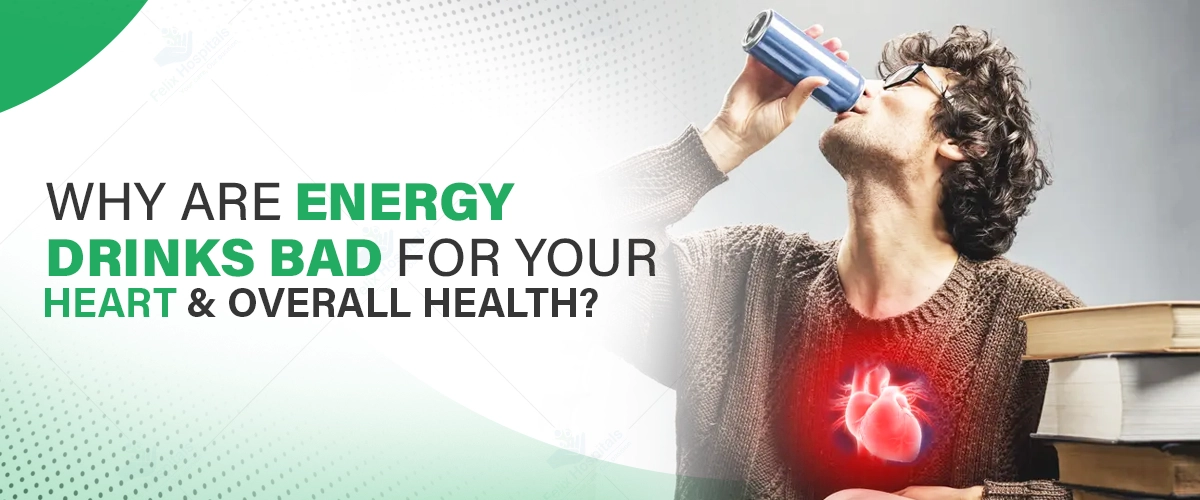
Subscribe to our

In the hustle and bustle of life today, energy drinks have become a go-to pick-me-up for many. Promising to improve concentration, alertness, and endurance, the drinks are most commonly found among students, athletes, and working individuals. However, beyond the temporary surge they provide, energy drinks are bad for your heart and overall health—most times, indeed, the hazards outweigh the benefits.
Let us see why you should reconsider reaching for that can and when it would be a good time to see a doctor at the best hospital in Noida nearby for a proper health check-up.
Consult specialist doctors at the best hospital for lifestyle and nutrition advice—because your heart health is worth the best. Call us today at +91 9667064100.
Energy drinks usually have a combination of the following:
All these ingredients are benign on their own in moderate amounts, but the overall impact—particularly at excessive amounts—is unhealthy.
Too much caffeine and the energy drink stimulants can rev up your heart and blood pressure. That can result in:
The undiagnosed suffer heart disease particularly. For others, one energy drink suffices to cause a severe cardiac condition.
Caffeine is a diuretic; it causes increased production of urine and can cause dehydration when not accompanied by the simultaneous intake of water. This is particularly dangerous when engaged in exercise, where hydration is essential. Dehydration also puts one at risk for kidney malfunction and blood pressure issues.
An energy drink has 30–40 grams of sugar—a day's supply. Too much sugar leads to:
The pairing of sugar and stimulants can provide an initial rush followed by a sudden drop in energy, so you're worse off than when you started.
Even if energy drinks can momentarily provide a boost in alertness, when consumed on the long term, they result in:
The stimulant effect of caffeine interferes with sleeping patterns, causing a sleepiness cycle and reliance on the beverages in order to remain awake.
Excessive use of energy drinks has also been associated with inflammation of the liver, particularly when consumed chronically or in combination with alcohol use. Excessive intake of some of the ingredients, such as niacin (vitamin B3), is toxic at high levels. The kidneys, too, are constantly under pressure from too much caffeine and dehydration, which could result in permanent damage.
Energy drinks also bring about sudden increases in blood pressure, which if done repeatedly over time, can impair blood vessels and lead to stroke. Those who have a family history of hypertension should be extremely careful since the long-term consequences are fatal.
If you require energy that lasts but without posing health dangers, do the following:
These alternatives feed your body while keeping your heart and brain in prime shape with the help of the best cardiologists in Noida/Greater Noida.
If you use energy drinks regularly and have:
Recommending consulting with the best cardiology hospital. Early assessment at the best hospital may screen out or treat heart conditions, metabolic disorders, or mental illnesses early.
Suffering from the effects of too much energy drink? Book an appointment for specialist consultation from the best hospital and have a comprehensive heart and health check-up today.
Energy drinks may promise a quick burst of energy, but they come at a cost—your long-term health. From damaging your heart to increasing the risk of diabetes and liver issues, the risks outweigh the temporary benefits.
If you are addicted to these beverages daily, then maybe it's time to shift your lifestyle and visit a doctor. Take care of your health by opting for better ones and, when required, consult professionals from the best hospital that can guide you toward a healthier life at an affordable cost.
1. Can daily energy drink consumption damage your heart?
Ans- While an occasional energy drink will not cause long-term damage, even one that has high caffeine and sugar content can produce palpitations in the heart, especially in those with existing heart conditions.
2. Is it riskier to mix energy drinks and alcohol?
Ans- Yes. Mixing energy drinks and alcohol masks alcohol's sedative effect, leading to alcohol being used more, more stress on the heart, dehydration, and higher risk of cardiac events.
3. Are sugar-free energy drinks healthier for you?
Ans- Sugar-free does not equal risk-free. Most still have gigantic amounts of caffeine and other stimulants that impact your heart, blood pressure, and mood in the long run.
4. How are energy drinks impacting teenagers and young adults differently?
Ans- Young adults are more susceptible to stimulants and are at risk for disturbed sleep, increased anxiety, and arrhythmia risk with repeated exposure.
5. Do energy drinks interact with prescription medications?
Ans- Yes. Energy drinks can interact with medications taken for high blood pressure, anxiety, or depression and decrease their effectiveness or produce side effects such as jitteriness or an irregular heartbeat.
6. What are some of the tests for identifying heart problems due to energy drinks?
Ans- An ECG, blood pressure test, liver function tests, and a complete metabolic panel can detect early signs of heart or organ stress. These are found at the best hospital.
7. How long do energy drinks' effects stay in the body?
Ans- Caffeine and other stimulants can last as long as 12 hours within your body, interfering with sleep and having after-effects like anxiety or heart palpitations, even after several hours have lapsed since consumption.